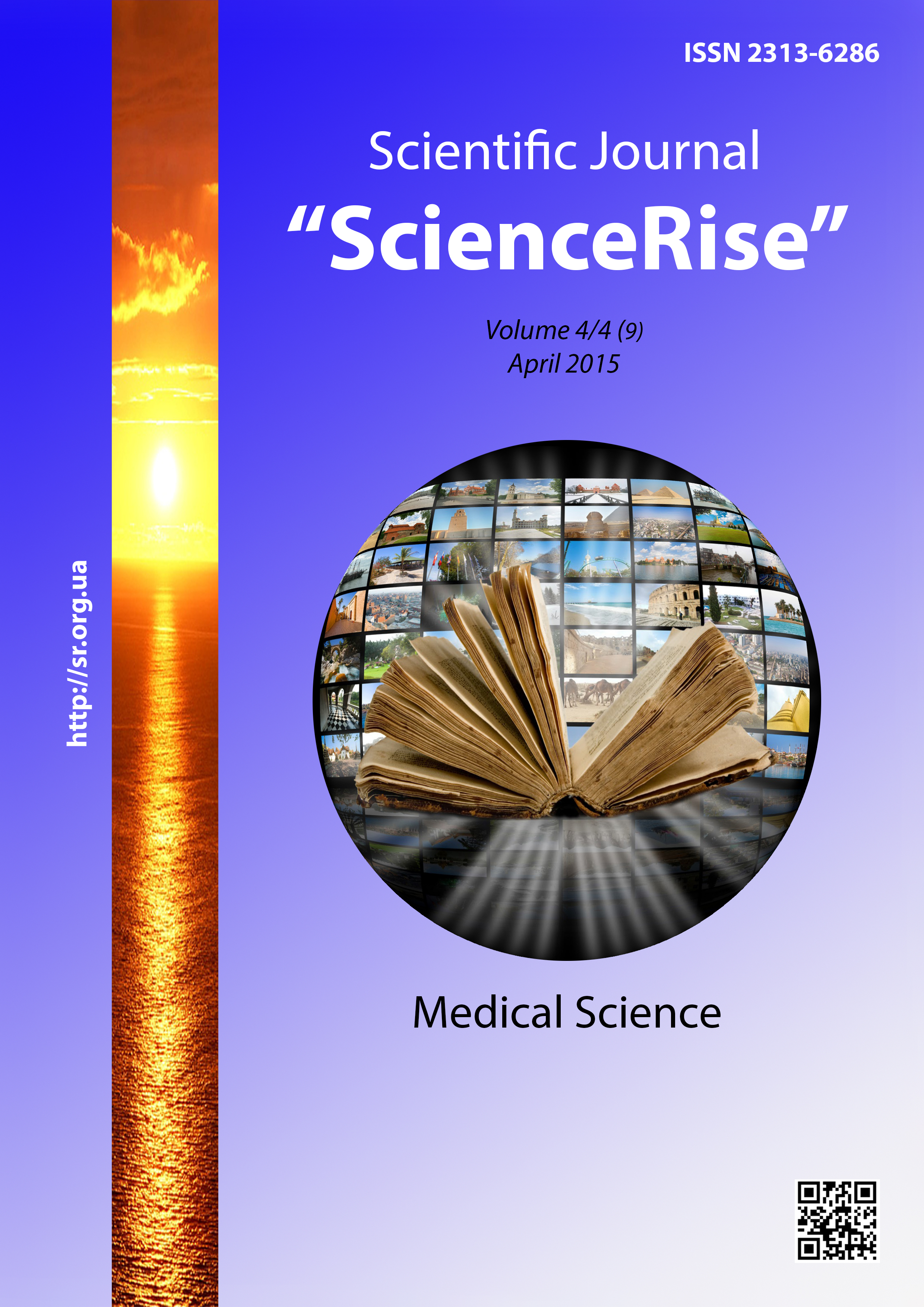Аналіз залежності маркерів стресу, інтенсивності болю та когнітивних показників у пацієнтів молодого віку, прооперованих з приводу травм кінцівок в умовах різних видів анестезії
DOI:
https://doi.org/10.15587/2313-8416.2015.41744Ключові слова:
регіонарна анестезія, загальна анестезія, травма кінцівок, когнітивні функції, маркери стресу, рівень болюАнотація
У статті проведено аналіз перебігу періопераційного періоду після металоостеосинтезу у пацієнтів молодого віку в умовах різних видів анестезії шляхом вивчення когнітивних показників та маркерів стресу. Було виявлено, що у пацієнтів всіх груп стан когнітивних функцій не погіршується, а рівень маркерів стресу свідчить про адекватний антиноцицептивний захист під час оперативних втручань
Посилання
Barash, P., Cullen, B., Stelting, R. (2004). Clinical Anesthesia. Moscow: Medical literature, 592.
Duke, G. (2005). Secrets of anesthesia. Moscow: MEDpress-inform, 552.
Pollard, B. J. (Ed.) (2006). Manual of Clinical Anesthesiology. Moscow: MEDpress-inform, 912.
Rafmell, D. P., Neal, D. M., Viskoumi, K. M.; Zilber, A. P., Maltsev, V. V. (Eds.) (2007). Regional anesthesia: the most necessary in anesthesiology. Moscow: MEDpress-inform, 272.
Ryabov, G. A. (1994). Syndromes of critical states. Moscow: Medicine, 368.
Bolshedvorov, R. V., Kitchin, V. V., Fedorov, S. A., Likhvantsev, V. V. (2009). Epidemiology of postoperative cognitive disorders. Anesthesiology and resuscitation, 3, 20–22.
Schneider, N. A., Salmina, A. B., Shprakh, V. V. Cognitive impairment in young patients after surgery under general anesthesia. Available at: http://www.mif-ua.com/archive/article/2579 (Last accessed: 2008.05.06).
Usenko, L. V., Polinchuk, I. S. (2011). Cognitive impairment after general anesthesia in noncardiac interventions and the effect of early introduction Tiotsetama postoperative. Intern. nevrol. Zh., 6 (44), 65–69.
Ancelin, M. L., De Roquefeuil, G., Scali, J., Bonnel, F., Adam, J.-F., Cheminal, J.-C., Cristol, J.-P., Dupuy, A.-M., Carrière, I., Ritchie, K. (2010). Long-term post-operative cognitive decline in the elderly: the effects of anesthesia type, apolipoprotein E genotype, and clinical antecedents, 105–113. Available at: http://www.ncbi.nlm.nih.gov/pmc/articles/PMC3078520/
Fesenko, W. A. (2009). Pіslyaoperatsіynі kognіtivnі disfunktsії in dіtey. Bіl, znebolyuvannya i іntensivna terapіya, 1, 15–25.
Elkin, I. O. (2010). Disorders of higher mental functions in children, caused by general anesthesia and surgical stress. Ways of prevention and correction. Ekaterinburg, 36.
Biedler, A., Juckenhofel, S., Larsen, R. (1999). Postoperative cognition disorders in elderly patients. The results of the «International Study of Postoperative Cognitive Dysfunction» (ISPOCD1). Anaesthesist, 48 (12), 884–895.
Alkire, M. T., Haier, R. J., Fallon, J. H. (2000). Toward a unified theory of narcosis: brain imaging evidence for a thalamocortical switch as the neurophysiologic basis of anesthetic-induced unconsciousness. Conscious.Cogn., 9 (3), 370-386. doi: 10.1006/ccog.1999.0423
Devereaux, P. J., Ghali, W. A., Gibson, N. E., Skjodt, N. M., Ford, D. C., Quan, H., Guyatt, G. H. (2000). Physicians recommendations for patients who undergo noncardiac surgery. Clin. Invest. Med., 23 (2), 116–123.
Ancelin, M. L., de Roquefeuil, G., Ledesert, B. (2001). Exposure to anaesthetic agents, cognitive functioning, and depressive symptomatology in the elderly. British Journal of Psychiatry, 178 (4), 360–366. doi: 10.1192/bjp.178.4.360
Dijkstra, J. B., Jolles, J. (2002). Postoperative cognitive dysfunction versus complaints: a discrepancy in long-term findings. Neuropsychol. Rev., 12 (1), 1–14.
Mehta, Y., Singh, R. (2010). Cognitive Dysfunction after Cardiac Surgery, 115–120. Available at: http://iospress.metapress.com/content/pw4701vh3460x202/?p=d4db52962c7c47dd8e792766341f7050&pi=8
Vanderweyde, T., Bednar, M. M., Forman, S. A., Wolozin, B. Iatrogenic Risk Factors for Alzheimer's Disease: Surgery and Anesthesia, 91–104. Available at: http://iospress.metapress.com/content/187219057431p550/?p=228fc897f6d74c5ebfa2835ca97c8be9&pi=0-2010
Mason, S. E., Noel-Storr, A., Ritchie, C. W. (2010). The Impact of General and Regional Anesthesia on the Incidence of Post-Operative Cognitive Dysfunction and Post-Operative Delirium: A Systematic Review with Meta-Analysis, 67–79. Available at: http://iospress.metapress.com/content/n143745w332707m0/?p=a1c4f21c34cd43a187db75531dee3925&pi=14
Silverstein, J. H. (2014). Influence of Anesthetics on Alzheimer's Disease: Biophysical, Animal Model, and Clinical Reports, 839–848. Available at: http://iospress.metapress.com/content/r225420432734r2k/
Callaway, J. K., Jones, N. C., Royse, A. G., Royse, C. F. (2015). Memory Impairment in Rats after Desflurane Anesthesia is Age and Dose Dependent, 995–1005. Available at: http://iospress.metapress.com/content/m3rk427251020173/?p=4d027d794c464eea966e81a4b51a2ce5&pi=23
Shao, H., Zhang, Y., Dong, Y., Yu, B., Xia, W., Xie, Z. (2014). Chronic Treatment with Anesthetic Propofol Improves Cognitive Function and Attenuates Caspase Activation in Both Aged and Alzheimer's Disease Transgenic Mice, 499–513. Available at: http://iospress.metapress.com/content/mw132u356188m765/?p=f816c3149cad41e2b7057182ed47a180&pi=2
Ilvan, G., Özköse, H. Z. (2015). The effect of total intravenous anesthesia on the postoperative cognitive functions of young and elderly patients after lumbar disk surgery. Turkish journal of medical sciences, 45, 191–196. Available at: http://journals.tubitak.gov.tr/medical/issues/sag-15-45-1/sag-45-1-30-1311-29.pdf doi: 10.3906/sag-1311-29
Zilber, A. P. (1984). Clinical Physiology in Anesthesiology and Intensive Care. Moscow: Medicine, 480.
Reis, F. M., Ribeiro-de-Oliveira, A. Jr., Machado, L., Guerra, R. M., Reis, A. M., Coimbra, C. C. (2008). Changes in prolactin and plasma glucose induced by surgical stress single or dual reaction? Mini-Review (Translation and processing Fesenko). Medical emergency conditions, 5 (18), 108–114.
Golub, I. E., Sorokin, L. V. (2005). Surgical stress and pain relief. Irkutsk: ISMU, 201.
Lyuboshevsky, P. A. (2012). Surgical stress response in abdominal operations of high trauma and the possibility of anesthetic correction. Anesthesiology and Intensive Care. Moscow, 42.
Rasmussen, L. S., O'Brien, J. T., Silverstein, J. H., Johnson, T. W., Siersma, V. D., Canet, J., Jolles, J., Hanning, C. D., Kuipers, H. M., Abildstrom, H., Papaioannou, A., Raeder, J., Yli-Hankala, A., Sneyd, J. R., Munoz, L., Moller, J. R. (2005). ISPOCD2 Investigators: Is peri-operative cortisol secretion related to post-operative cognitive dysfunction? Acta Anaesthesiol. Scand., 49, 1225–1231. Available at: http://onlinelibrary.wiley.com/doi/10.1111/j.1399-6576.2005.00791.x/full
##submission.downloads##
Опубліковано
Номер
Розділ
Ліцензія
Авторське право (c) 2015 Наталія Миколаївна Богуславська

Ця робота ліцензується відповідно до Creative Commons Attribution 4.0 International License.
Наше видання використовує положення про авторські права Creative Commons CC BY для журналів відкритого доступу.
Автори, які публікуються у цьому журналі, погоджуються з наступними умовами:
1. Автори залишають за собою право на авторство своєї роботи та передають журналу право першої публікації цієї роботи на умовах ліцензії Creative Commons CC BY, котра дозволяє іншим особам вільно розповсюджувати опубліковану роботу з обов'язковим посиланням на авторів оригінальної роботи та першу публікацію роботи у цьому журналі.
2. Автори мають право укладати самостійні додаткові угоди щодо неексклюзивного розповсюдження роботи у тому вигляді, в якому вона була опублікована цим журналом (наприклад, розміщувати роботу в електронному сховищі установи або публікувати у складі монографії), за умови збереження посилання на першу публікацію роботи у цьому журналі.

